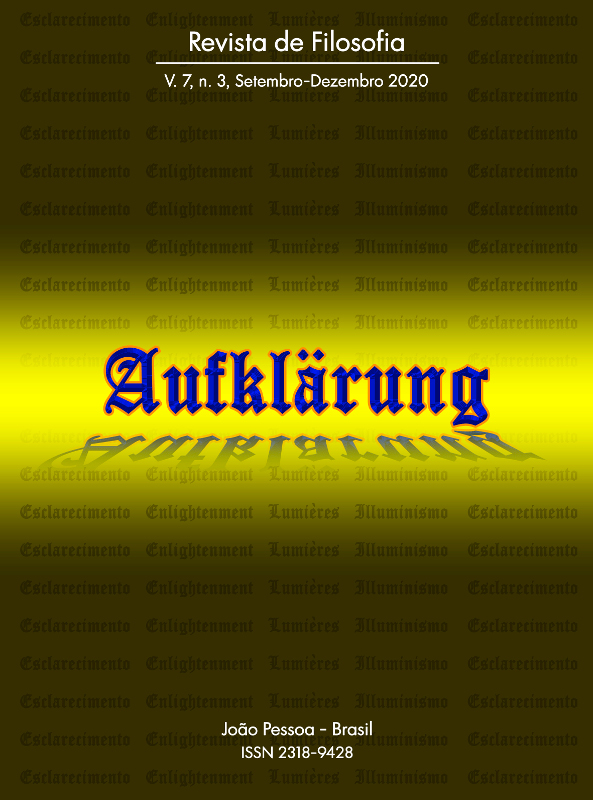Activity and Human Condition in Hannah Arendt
DOI:
https://doi.org/10.18012/arf.v7i3.54586Keywords:
Hanah Arendt, human condition, active life, Karl MarxAbstract
We would like to demonstrate in this essay that it is possible to establish a relationship between Arendt and Marx about the concepts of "active life" and "human condition", despite Arendt's criticism of Marx in The Human Condition. We will argue that Marx and Arendt depart from a conception of man as an active being. Arendt is anchored in the concept of “energeia” in Aristotle, and Marx in the concept of "activity" of German Idealism. Both seek to overcome the predominance of contemplation over action. In addition to this common assumption, Marx, contrary to what Arendt says, but according to his perspective, establishes a distinction between "work", associated with useful work producing value of use, and work, thought not as metabolism with nature, as Arendt says, but as work under capitalist conditions of production. In fact, we argue that the idea of being active in its triple articulation with the work, work and the action theorized by Arendt prolongs Marx's perspective. From this perspective, the concept of inversion, that is, the reversal of the hierarchy between contemplation and action, is fundamental for certain how much Arendt prolongs Marx's perspective.
Downloads
References
ARENDT, H. A Condição Humana. 12 ed. rev. RJ: Forense, 2014
ARENDT,H. Essays of Understanding: 1930-1954. 1 ed. NY: Harcout, 2005
ARISTÓTELES. Ética a Nicômaco. Brasília: 2009,
A. VON Cieszkowski. Prolègomèes à l’historiosohie. Berlim, 1838, trad. De M. Jacob, paris, Ed. Champ Libre 1973
HABERMAS, J. O Discurso Filosófico da Modernidade. SP: Martins Fontes, 2000.
HEIDEGGER, M. Etre et Temps. Paris: Gallimard, 1986.HEIDEGGER, M. HEIDEGGER, M. Questions III e IV. Paris: Gallimard, 1976.
HEIDEGGER, M. A origem da obra de arte. Lisboa: Edições 70, 2004.
HESS, Moses. La philosophie de l’action, In. Moses Hess, la philosophie, le socialisme : 1836-1845 / Gérard Bensussan ; en annexe, trois textes de Moses Hess, Socialisme et communisme, Philosophie de l'action. Bruxelas: Olms, 1995.
MARX, K. Le Capital, Livro 1. Paris: PUF, 1993.
MARX, K. Manuscrits economique-philosophiques de 1844. Tradução de Franck Fishback. Paris: Vrin, 2007.
MARX, K. Les Thèses sur Feuerbach. Commentaires de Georges Labica. Paris: PUF, 1987.
MARX, K e ENGELS, F. L’Idéologie Allemande. Paris: Ed. Sociales, 1930.
POSTONE, Moishe. Tempo, trabalho e dominação social. São Paulo: Boitempo, 2014.
RICOEUR, P. Idéologie et utopie. Paris: Seuil, 2005.
ROCKMORE, Tom. Marx, Fichte and the German Philosphy. 1980, p.
TAMINIAUX, J. Heidegger and the Project of Fundamental Ontology. State University of New York Press, 1991.
KOUVÉLAKIS, S. Philosophie et Revolution de Kant à Marx. La Fabrique Editions, 2014.
TAYLOR, Charles. Hegel and the Philosophy of Action, Arto Laitinen & Constantine Sandis (eds.), Hegel on Action. Palgrave-Macmillan, 2010, pp. 01-41.
VILA, D. Arendt and Heidegger – The Fate of the Political. Princenton, New Jersey, University Press, 1996.
Additional Files
Published
How to Cite
Issue
Section
License
Journal general policy
1.This journal works under a Creative Commons License aplied to online journals. That icence can be read in the following link: Creative Commons Attribution 4.0 International (CC BY 4.0).
2.Accordingly to this License, a)the journal declares that authors hold the copyright of their articles without restrictions, and they can archieve them as post-print elsewhere. b)the journal allow the author(s) to retain publishing rights without restrictions.
Metadata Policy for information describing items in the repository
1. Anyone may access the metadata free of charge at anytime.
2.The metadata may be re-used in any medium without prior permission, even commercial purposes provided the OAI Identifier or a link to the original metadata record are given, under the terms of a CC BY license refered for the Journal.







































